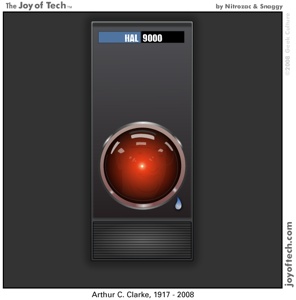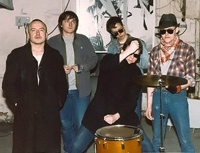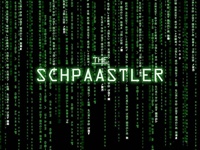 This week, the world got a lot less interesting, when the visionary, humanist, inventor and author Arthur C. Clarke died. I really considered not commenting on it, because others would be better at it, and the picture from Joy of Tech on the left sums up my feelings.
This week, the world got a lot less interesting, when the visionary, humanist, inventor and author Arthur C. Clarke died. I really considered not commenting on it, because others would be better at it, and the picture from Joy of Tech on the left sums up my feelings.
Remembering a great visionary and humanitarian
Arthur might not be the best writer, but his clear visions, belief in humanity and always good spirit was such an inspiration.
Clarke has mostly been remembered for his two most famous contributions to the collective heritage of humankind:
- The movie 2001
- The concept of Geo-synchronous communications satellites
The only thing that I feel sorry for, is that Arthur didn’t live to witness the discovery of Extraterrestial Intelligence, which I’m sure is on the verge of happening, and when we have First Contact, I hope that the politicians and scientists read the works of Arthur C. Clarke, before trying to understand E.T., I really feel that Arthur did.
First Contact
I’ll give you an example, and it’s my favourite part from one of his books, “The Fountains of Paradise”.
As is traditional with the novells by Arthur C. Clarke, the plot contains several independent sub-plots, and that is the strongest aspect of his writing, it never gets dull, and it’s filled with humour, and insights into humanity.
The main plot in the “Fountains of Paradise” is really about the construction of an elevator to the Clarke Belt, the geo-synchronous orbit, 36,000 kms from Earth.
But the by-line is a story about First Contact – e.g. the discovery of intelligent Extraterrestrials – a favourite topic of Clarke – it’s also about Artificial Intelligence – the favourite topic of Clarke.
The sub-plot is similar to “Rendezvous with Rama”: Due to universal limits of relativity, you can only travel at sub-light speeds. Another universal law is that the ordinary life-spans are too short even for ET, so ET is investigating the universe using unmanned probes.
Earth, or rather the solar system, is visited by such a a spaceship, and onboard is a computer or more correctly an AI – that is somewhat secretive – but co-operative – and we have so much to learn, like the fact that we’re an emerging level 1 Civilisation, at least in the 22nd Century, where the book is taking place.
Clarke suggested that advanced Civilisations goes through three levels:
- Civilisation can control energy on Planetary level
- Civilisation can control energy on Solar level
- Civilisation can control energy on Galactical level
Needless to say we’re not even a level 0 civiisation right now. When ET finally arrives, some hundred years after the probe visited, he expresses admiration for the achievements of “such a young civilisation.
Well the computer abroad the space-probe, is co-operating and teaching us lot’s of things, without violating the rules about giving away information posessed by a higher level civilisation, so we’re only given hints, like a level 1 civilisation, has mastered the conversion of matter to energy and back – e.g. has things like matter transporters and replicators, like in Star Trek.
That is until someone at a Theological Institute decides to transmit the complete religious scriptures to the computer, it painstakingly analyses it, points out the fundamental flaws of religious thinking, shuts down communication with a comment that expresses disappointment at such tribal manners from an emerging level 1 Culture, and sorry but now you have to switch to direct communications, going to cruise mode, shutting down, bye.
Mind you, ET is 50 light-years away, so everyone was upset by the actions of the religious people, but really it was also the end of religious thought, and humanity could move on the bigger projects, like building the space elevator.
The concept of the Space Elevator was lifted from a Russian scientist Konstantin Tsiolkovsky, that Arthur credits in the closing notes of “Fountains”. Clarke also suggests that it might be possible to build it already in this century, and the concept is well thought out, and actually feasible with current technology, unfortunately the current funding of space exploration, dictates direct military benefits, and the military seems to love chemical rockets, what a shame.
Other contributions
Another important contribution by Clarke, was his 80th birthday special feature, where Discovery dedicated an entire evening to Arthur, another was his series The “Arthur C. Clarke’s Mysterious World”, where he was also dealt with myths and Urban legends, paving the way for the “Mythbusters”.
Clarke deserved the Nobel Peace Price, not least for deciding to live his final many years in war-torn Sri Lanka.
The Pod Bay doors have been opened, Godspeed Arthur
The Imperial Cinema in Copenhagen is showing “2001: A Space Odyssey” on Monday 24th of March oops April 28th at 3.45pm CEST.
Imperial has one of the best cinemas in Northern Europe, expect me to be in the audience, I can’t really think of a better way to pay tribute to Arthur, get your ticket here (link will probably expire soon ;-)).
I’m humbled by your creative vision: The Pod Bay doors have been opened, and my God it’s full of Stars. Godspeed Arthur!
The picture that accompanies this article is from the great comic strip, The Joy of Tech. I dare to claim “fair use”, and why don’t you click here to buy some merchandise, or one of the paintings – I’d love to own “HAL 9000 shedding a tear” as a painting. BTW: I’m not making any money from providing Joy of Tech with such a link, welcome to the future of advertising ;-).






